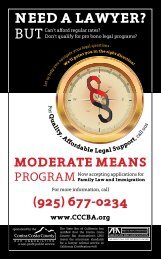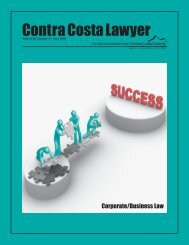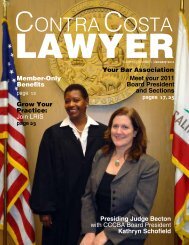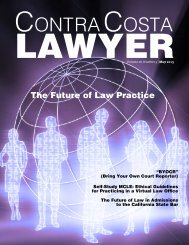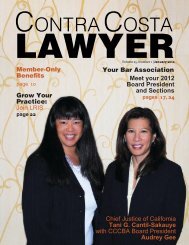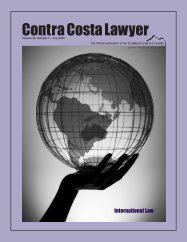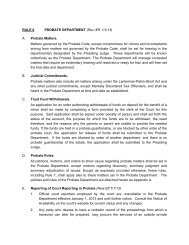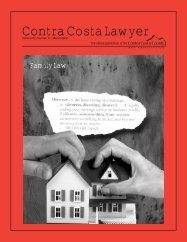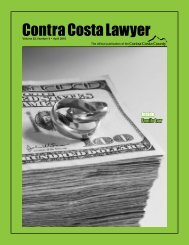Ethical Risk Areas for MediationConflicts of InterestClient AuthorityClient Expectationsby Linda DeBeneConfidential CommunicationsNegotiation StrategiesWe all see it. It is so commonplace that most of us do not blink an eye. It seems that just about every day there is anothernews article about it — ethics (or lack thereof) in or related to the law. Unethical judges throwing cases, taking money,acting out in courtrooms, harassing staff; politicians involved in unethical behavior in their official / personal lives;unbelievable Ponzi schemes that run rampant over legal ethics/accounting rules; foreclosure counselors (including lawyers)taking money from the disadvantaged for promised services that are never performed; “trusted” sons / daughtersabusing elderly parents aided by intentional unethical/illegal acts of attorneys / accountants. Ethics is front page news.While it is ADMittedly RAREto see a news article about ethical dilemmasfaced by mediators in daily practice, theyare more common than one would think.Bearing in mind that mediators are leftalone to resolve issues relating to “ethicalconflicts” raised as a result of acts ofcounsel vis-a-vis their clients or opponentsin mediation, it is important to alertpractitioners to some of these issues inlight of the current ethical (or unethical)climate de jour.Most mediators typically see (andcan handle with relative aplomb) skillsdilemmas — knowing how to implementaction in a mediation setting but not beingcertain about the effect it may have —while ethical / moral conflicts arise moreinfrequently. In the latter instance, themediator is uncertain as to how to implementor choose a course of action withoutdoing harm, possibly unwittingly, to anopposing party involved in the conflict.A mediator, for example, is presented withuse of mediation by a party solely to gaininformation, win time, or intimidate.Consider being at mediation in privatecaucus and one side’s attorney commentsthat s/he has no authority, adding “we areat mediation purely to see how low theother side will go.”What are some typical issues presentedto the mediator by such actions of counsel?Of course one thinks immediately of abuseof the process or lack of good faith negotiation,obvious first complaints raised bythe opponent. However, failure to followdirectives of a mediator or court for personalattendance of representatives withsettlement authority can be the thorniestproblem a mediator faces. Courts makerules about attendance, but rarely act toenforce them. So what are mediators todo? In light of counsel’s conduct (ethical?not ethical?), what course of action isproper for the mediator to take?The obligations of counsel making sucha statement are ethical minefields. Privatecounsel usually bring a client with authorityto decide, but often without money topay. Insurance counsel are supposed torepresent the client, but have seriousconflicts with loyalty. Many carriers havecaptive / house counsel, or outside insurancecounsel, with a potential desire formore / continued business from carriers.Thus, for example, they do not push hardenough to have carrier representatives atthe sessions, or they have written liabilityreports that lean in favor of “no liability”reporting, resulting in small or no reserves.So who is being served?Dealing with such ethical conflicts callsfor a skill set that often goes beyondtypical mediation training. Procedurally,ethical conflicts have to be analyzed bythe mediator on the spot, considering firstwhether the mediator is a judicial or quasijudicialofficer (pro-tem or referee withpower to conduct settlement conferences).The mediator then has to decide whetherany reporting can be done to the courtunder California (or applicable federal)statute or rule, or by stipulation of theparties. Or, alternatively, is the mediatoronly a passive facilitator — the “hallmonitor” — moving information backand forth without any “hammer” or18 November 2009
procedure available to deal with theannounced “no authority” position?Unfortunately, under current Californiastatute and case law (not being able toreport to the court [Evidence Code §§1119and 1121] and being incompetent totestify [Evidence Code §703.5]), mediatorsare left with no means to resolve theethical conflict, leaving the ability to aidresolution of the case as a standoff.Another area of ethical conflict involvesthe maintenance of confidentiality in casesinvolving illegal actions of parties. Onemight easily imagine being asked to mediatenegotiations between a bank robberor terrorist, his / her hostages and police(think Al Pacino in Dog Day Afternoon).Clearly, an unfair settlement is shapingup, an imbalance of power. The emotionalityof the process and the probability ofharming parties or innocents if an agreementis not reached could rise or fallbecause of confidential information that isor is not disclosed, or which is improperlydisseminated, albeit with good intentions.Not reaching agreement in such a circumstance,thereby not solving the parties’problems, increases the probability ofharm to parties/innocents. The mediator’shands in solving the ethical/moral conflictthat arises are tied by the confidentialityprovisions of California law.Consider a more common scenario: thegovernment exercising its right of eminentdomain to demolish the home of a poorperson (that cannot be replaced in thecurrent market or even in a good market)to build a shopping center proposed by abillionaire developer, taking property forpersonal gain of the developer’s privateinterest. The mediator is presented anethical conflict when one counsel insistson non-disclosure of the settlement (nondisclosuremay convince a party to acceptthe proposal) and the government musthave it publicly approved.Ethical conflict situations face mediatorsevery day in common practice as aresult of emotional reactions to partybehavior at mediation (sympathy, antipathy,anger); lack of informed consentbetween parties and their counsel due toparty ignorance of factual, legal or expertinformation; coercion or mental disturbance— all matters typically unknown tothe mediator. One typical situation leadingto such conflict: a mediator sees an attorneywithout specific “practice knowledge” whohas had a dispute with the client over whatthe client wants out of mediation. Maybea worker compensation specialist doing afavor for a friend or family member ishandling an employment case. The lack ofemployment practice expertise may leadto the otherwise competent counsel notbeing able to properly analyze the case,resulting in the client attending mediationwith unreasonable expectations.Similarly, an “out of practice area”attorney advises the mediator for the firsttime at the mediation session of a realestate case that he “never talks about u<strong>Contra</strong> <strong>Costa</strong> Lawyer 19



